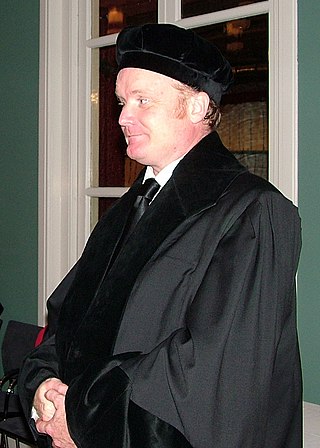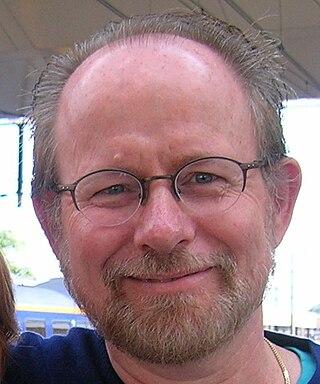Related Research Articles
Rendaku is a phenomenon in Japanese morphophonology that governs the voicing of the initial consonant of a non-initial portion of a compound or prefixed word. In modern Japanese, rendaku is common but at times unpredictable, with certain words unaffected by it.

Syntactic Structures is an important work in linguistics by American linguist Noam Chomsky, originally published in 1957. A short monograph of about a hundred pages, it is recognized as one of the most significant and influential linguistic studies of the 20th century. It contains the now-famous sentence "Colorless green ideas sleep furiously", which Chomsky offered as an example of a grammatically correct sentence that has no discernible meaning, thus arguing for the independence of syntax from semantics.
In linguistics, relexification is a mechanism of language change by which one language changes much or all of its lexicon, including basic vocabulary, with the lexicon of another language, without drastically changing the relexified language's grammar. The term is principally used to describe pidgins, creoles, and mixed languages.

Bert Vaux teaches phonology and morphology at the University of Cambridge. Previously, he taught for nine years at Harvard and three years at University of Wisconsin–Milwaukee. Vaux specializes in phonological theory, dialectology, field methodology, and languages of the Caucasus. Vaux was editor of the journal Annual of Armenian Linguistics from 2001 to 2006 and is co-editor of the book series Oxford Surveys in Generative Phonology.
Jan Koster is a Dutch linguist and professor emeritus at the University of Groningen.

The Linguistic Review is a double-blind peer-reviewed academic journal covering linguistics established in 1981 and published by Walter de Gruyter. The editor-in-chief is Harry van der Hulst.
Linguistics is the scientific study of language. Linguistics is based on a theoretical as well as a descriptive study of language and is also interlinked with the applied fields of language studies and language learning, which entails the study of specific languages. Before the 20th century, linguistics evolved in conjunction with literary study and did not employ scientific methods. Modern-day linguistics is considered a science because it entails a comprehensive, systematic, objective, and precise analysis of all aspects of language – i.e., the cognitive, the social, the cultural, the psychological, the environmental, the biological, the literary, the grammatical, the paleographical, and the structural.
Willem Leo Marie (Leo) Wetzels is a full professor at the Vrije Universiteit Amsterdam in the Netherlands and Directeur de recherche at Laboratoire de Phonétique et Phonologie (LPP), CNRS/Sorbonne-Nouvelle in Paris. He is Editor-in-Chief of Probus International, the Journal of Latin and Romance Linguistics.
Junko Itō is a Japanese-born American linguist. She is emerita research professor of linguistics at the University of California, Santa Cruz.
Martha Young-Scholten is a linguist specialising in the phonology and syntax of second language acquisition (SLA).
Carlos Gussenhoven is a professor of linguistics at Radboud University Nijmegen. He specializes in phonetics and phonology.

Willem Johannes Maria (Pim) Levelt is a Dutch psycholinguist. He is a researcher of human language acquisition and speech production. He developed a comprehensive theory of the cognitive processes involved in the act of speaking, including the significance of the "mental lexicon". Levelt was the founding director of the Max Planck Institute for Psycholinguistics in Nijmegen. He also served as president of the Royal Netherlands Academy of Arts and Sciences between 2002 and 2005, of which he has been a member since 1978.

Marc van Oostendorp is a Dutch linguist and Esperantist. From 2004 he has served as a weekly commentator on linguistics for Radio Noord-Holland. Since 2007, he has researched phonological microvariation, dialectology and interlinguistics. He is currently attached to the Radboud University in Nijmegen.
Heather Goad is a Canadian linguist. Her research explores areas of phonology and language acquisition, especially investigating the shapes of phonological systems, including contrasts in English, French, Korean, Portuguese, Italian and Nepali, as well as the developmental paths of acquiring speech sounds by first and second language learners.

Artemis Alexiadou is a Greek linguist active in syntax research working in Germany. She is professor of English linguistics at the Humboldt University of Berlin.

Harry van der Hulst is full professor of linguistics and director of undergraduate studies at the department of linguistics of the University of Connecticut. He has been editor-in-chief of the international SSCI peer-reviewed linguistics journal The Linguistic Review since 1990 and he is co-editor of the series ‘Studies in generative grammar’. He is a Life Fellow of the Netherlands Institute for Advanced Study, and a board member of the European linguistics organization GLOW.
Liliane Madeleine Victor Haegeman ARB is a Belgian professor of linguistics at Ghent University. She received her PhD in English linguistics in 1981 from Ghent University, and has written numerous books and journal articles thereafter. Haegeman is best known for her contributions to the English generative grammar, with her book Introduction to Government and Binding Theory (1991) well established as the most authoritative introduction on the Principles and Parameters approach of generative linguistics. She is also acknowledged for her contributions to syntactic cartography, including works on the left periphery of Germanic languages, negation and discourse particles, and adverbial clauses. As a native speaker of West Flemish, her research has also touched upon the comparative study of English and West Flemish in terms of the subject position and its relation to the clausal structure.
Irene B. Vogel is an American linguist, specializing in phonology. She is a professor in the University of Delaware Linguistics and Cognitive Science Department, best known for her work on the phonology-syntax interface.
Michael K. Brame was an American linguist known for his contributions to the field. He served as a professor at the University of Washington and was the founding editor of the peer-reviewed research journal, Linguistic Analysis. Brame's work focused on the development of recursive categorical syntax, also referred to as algebraic syntax, which integrated principles from algebra and category theory to analyze sentence structure and linguistic relationships. His framework challenged conventional transformational grammar by advocating for a lexicon-centered approach and emphasizing the connections between words and phrases. Additionally, Brame collaborated with his wife on research investigating the identity of the author behind the name "William Shakespeare", resulting in several publications. His legacy is marked by his impactful contributions to linguistic theory and his exploration of language intricacies.
Henk van Riemsdijk is a Dutch linguist and professor emeritus at Tilburg University.
References
- ↑ List of publications at Royal Dutch Library, July 2020.
- ↑ Shanghai Municipal Education Commission, December 2009 (in Chinese)
- ↑ Webpage at College of English Language and Literature, Shanghai International Studies University